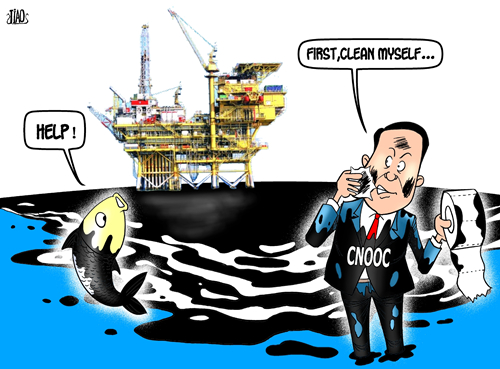Oil spill cover-up shows economic interests still supreme
- By Gong Wen
 0 Comment(s)
0 Comment(s) Print
Print E-mail
China.org.cn, July 13, 2011
E-mail
China.org.cn, July 13, 2011
|
|
|
[By Jiao Haiyang/China.org.cn] |
When the State Oceanic Administration disclosed details from the investigation on the oil spill near Penglai 19-3 oilfield on July 5, nearly one month had passed since the spill in Bohai Bay. Before the SOA press conference, the public had no idea about what really happened in Bohai Bay. Rumors about the accident were pervasive on the Internet since early June but were denied by China National Offshore Oil Corp.
Both CNOOC, which is one of the three biggest oil companies in China, and SOA claim that they reported the spill to administrative departments and provincial governments immediately after the accident happened. But people, especially those who live near the area, did not receive any alert that the region was contaminated and that they should take precautions. BP disclosed the oil spill in the Gulf of Mexico to the public only four days after the accident. In an interview, CNOOC said that they decide if an accident should be publicized based on the seriousness of it. Because the oil spill in Bohai Bay was much smaller than that in the Gulf of Mexico, they did not report it to the public as quickly.
But the right to know is one of people's basic rights. People deserve to know of all accidents, especially environmental ones that may affect public interests, no matter how serious they are. Furthermore, the seriousness of an accident ought to be judged by the public rather than companies causing the pollution. To some degree, there is little distinction between serious and non-serious where environmental problems are concerned. Any behavior that hides the facts and truth of events related to public interests should be punished.
Companies sometimes are not willing to tell the public what is going on because it may make them look bad. CNOOC's behavior on the Bohai Bay spill is a typical example. The government should have the oversight to make sure the information is released. But this time, it did not do this job well. According to the report, the SOA received information of the oil spill in early June and did not inform the public immediately. Provincial governments also received the report soon after the accident, but none of them publicized the message, either.
Though there are regulations regarding the release of information, many government officials do not heed them. They still put economic interests above all, ignoring environmental costs and public interests. They misunderstand the goal of economic development, which aims to better the lives of all people. If rapid development comes at a cost to public interests and pollutes the environment, then it bears no significance.
Gong Wen is a visiting scholar at the School of Journalism and Communication at Tsinghua University.
Opinion articles reflect the views of their authors, not necessarily those of China.org.cn.







Go to Forum >>0 Comment(s)